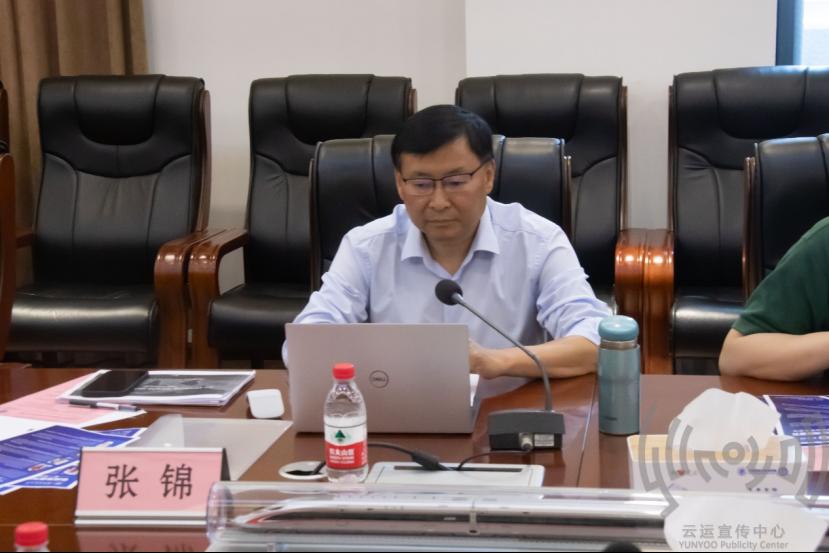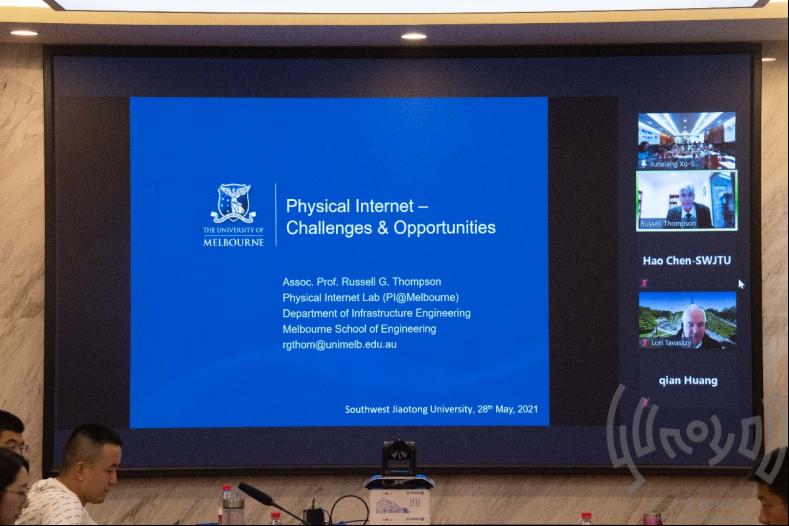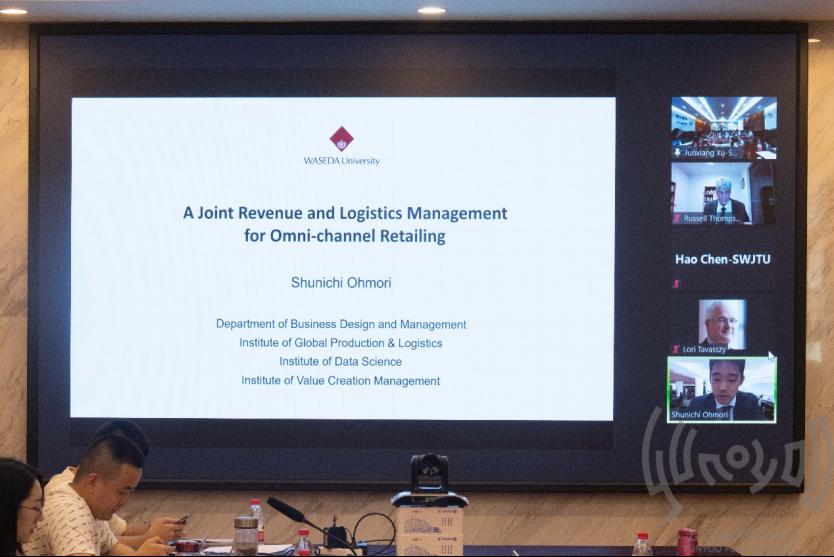At 2:30 pm on May 28th, the 2nd International Conference on Logistics and Supply Chain Network which was hosted by Southwest Jiaotong University and undertaken by the School of Transportation and Logistics and the Institute of Logistics was held in the Transportation Building through the mode of “online + offline”. The topic of the conference was "Optimization of Logistics Channels and Transportation Networks". The initiator of this conference is Professor Zhang Jin of our college. The conference invited Professor Lóri A. Tavasszy from Delft University of Technology in the Netherlands, Professor Russell G. Thompson from the University of Melbourne in Australia, Professor Shunichi Ohmori from Waseda University in Japan and PhD student Guo Jingni from Southwest Jiaotong University to conduct special reports. Among the guests participating in this meeting were Liang Hongbin, Qiu Xiaoping, Zhang Xiaoqiang, Mao Min, Wang Kun, Li Guoqi, Ma Xiaolai and Wu Yu. The meeting was hosted by Professor Zhang Xiaoqiang.

At the beginning of the meeting, Professor Zhang first expressed his gratitude to the participants for their support and introduced his team. Then, Professor Zhang mentioned that the academic conference aims to communicate with international academic colleagues on cutting-edge technologies and applications in the field of logistics and transportation, especially focusing on freight network design and planning, logistics strategic planning, supply chain management, emergency logistics management, etc. He introduced that in the first conference, the research on logistics and transportation network planning and optimization problems caused a good response, and this conference was based on “Optimization of Logistics Channels and Transportation Networks”. Finally, Professor Zhang Jin hoped that experts and scholars could actively share research results and learn from each other.

Next, four experts and scholars gave special academic reports.
The first was Professor Lóri A. Tavasszy from the Institute of Cargo and Logistics of Delft University of Technology in the Netherlands. Professor Tavasszy’s research involved freight modeling at the city, country and global levels. In addition to publishing the textbook "Freight Network Modeling", he had also published more than 70 papers in various journals and more than 150 articles in many books and conference proceedings. Professor Tavasszy is currently the chairman of the Scientific Committee of the World Transportation Research Society and the member of several national and international professional committees. His report was entitled "Re-thinking freight networks for resilience". He focused on the optimization ideas of freight network modeling considering resilience and related empirical research results and application scenarios.

The second was Professor Russell G. Thompson from the School of Civil and Environmental Engineering of University of Melbourne in Australia. Professor Thompson had participated in many local and international freight researches in the past 20 years. Currently, he was actively involved in several freight projects in Melbourne and Sydney, including high-productivity freight trucks, urban integration centers and the impact of COVID-19 on the freight network. He also focused on the research on physical Internet, parcel lockers, collaborative freight systems, road pricing, urban integration centers and multimodal transportation systems. Professor Thompson had also participated in many international studies on urban freight transport. At this conference, he gave an academic report with the title of "Physical Internet-Challenges & Opportunities". He focused on sharing the application of the Physical Internet in freight network planning, especially the contributions to the modeling of multimodal transport networks dominated by highway transport, railway transport and water transport in the Yunnan, Guizhou and Sichuan regions of China.
The third was Professor Shunichi Ohmori from the Faculty of Business Design and Management of Waseda University in Japan. His interest lied in operation management, including supply chain design, transportation management, facility planning, revenue management, service operation management and data-driven decision making. He had carried out many joint research projects based on practice with companies from manufacturing, logistics and retail industries.He also had many international cooperative researches and education projects from the United States, China, Thailand and Germany. The title of this academic report by Professor Shunichi Ohmori is "A Joint Revenue and Logistics Management for Omni-Channel Retailing". He focused on the operation management design modeling and algorithm problems of the Japanese service industry.

The last reportor was Dr. Guo Jingni from the School of Transportation and Logistics of Southwest Jiaotong University. Dr. Guo Jingni had been committed to the research of multimodal transport network risk management and control. Aiming at the phenomenon of cascading failures in the network, she explored scientific and reasonable risk assessment methods, risk propagation rules and multi-dimensional risk control strategies. She had published 30 papers in various journals, 14 of which were included in SCI and 7 of which were included in EI. Dr. Guo Jingni had participated in 12 national, provincial or ministerial scientific research topics. She had also won many awards, such as national scholarship, first-level scholarship, excellent Communist Party member, outstanding graduate student, etc. Dr. Guo Jingni’s lecture topic is “Resisting Cascading Failure in Network”. She mainly shared the research on optimization of network structure considering robustness and fragility in multimodal transport networks. She took Sichuan-Tibet area network in China as an example and shared research results.

During the conference, the four reporters focused on the theme and shared their research results through calculations and analysis with examples, which benefited everyone a lot. Many participants asked questions about the content of the report and experts answered their doubts in detail. They learned from each other and made progress together during the exchange process.

At the end of the meeting, Professor Zhang Jin summarized the meeting. He thanked the experts and scholars for sharing new technologies, scientific issues and classic cases in the optimization of logistics channels and transportation networks from different perspectives. At the same time, he expressed his expectation for maintaining contact, strengthening academic cooperation and jointly producing high-level academic achievements in the future. So far, the 2nd International Conference on Logistics and Supply Chain Network had been a complete success.